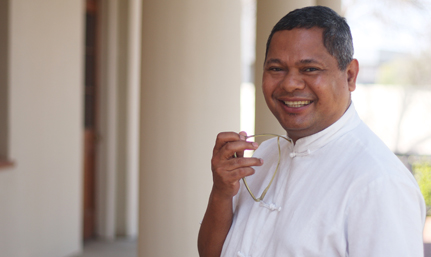Prof. André Keet appointed to Ministerial Oversight Committee on Higher Education
|

|
|
Prof. André Keet
Photo: Anja Aucamp
24 January 2013 |
Prof. André Keet, Director of the Institute for Reconciliation and Social Justice at the university, has been appointed as member of the Oversight Committee on the Transformation of South African Universities. He is one of seven committee members that were appointed by the Ministry of Higher Education and Training to monitor progress on transformation in public universities.
The committee will advise Dr Blade Nzimande, Minister of Higher Education and Training, on policy to combat racism, sexism and other forms of unfair discrimination in public higher education. The committee will also advise on the role of universities in promoting the development of a free, fair and non-discriminatory society beyond the world of the academia.
The senior leadership of the university has welcomed the appointment of Prof. Keet and said with his extensive experience as a former Commissioner on the Commission for Gender Equality and as the Director of the university's Institute for Reconciliation and Social Justice (which was formed as one of several initiatives taken by the senior leadership in the aftermath of the Reitz incident), Prof. Keet will be a valuable member of the committee.
"Prof. Keet has the experience and expertise to guard the autonomy and academic freedom of universities, thus avoiding this committee from becoming a political intervention in the affairs of the higher education sector," said Prof. Jonathan Jansen, Vice-Chancellor and Rector of the university.
Honoured to be elected on the committee, Prof. Keet said he is ready to serve the national interest in the transformation of South African universities. "The appointment is also a compliment to the university and to its exceptional experience in the process of transformation."
Prof. Keet will serve on the committee for a period of three years. The other members of the committee are Prof. Malegapuru Makgoba, who will serve as chairperson, Dr Mvuyo Tom, Ms Nazeema Mohamed, Ms Zingiswa Losi, Mr Joe Mpisi and Prof. Shirley Walters.